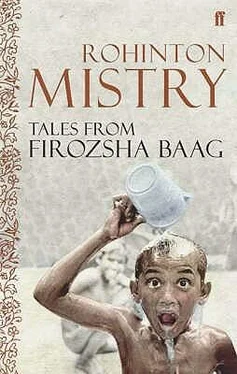Rohinton Mistry - Tales From Firozsha Baag
Здесь есть возможность читать онлайн «Rohinton Mistry - Tales From Firozsha Baag» весь текст электронной книги совершенно бесплатно (целиком полную версию без сокращений). В некоторых случаях можно слушать аудио, скачать через торрент в формате fb2 и присутствует краткое содержание. Год выпуска: 2006, Издательство: Faber & Faber, Жанр: Современная проза, на английском языке. Описание произведения, (предисловие) а так же отзывы посетителей доступны на портале библиотеки ЛибКат.
- Название:Tales From Firozsha Baag
- Автор:
- Издательство:Faber & Faber
- Жанр:
- Год:2006
- ISBN:нет данных
- Рейтинг книги:3 / 5. Голосов: 1
-
Избранное:Добавить в избранное
- Отзывы:
-
Ваша оценка:
- 60
- 1
- 2
- 3
- 4
- 5
Tales From Firozsha Baag: краткое содержание, описание и аннотация
Предлагаем к чтению аннотацию, описание, краткое содержание или предисловие (зависит от того, что написал сам автор книги «Tales From Firozsha Baag»). Если вы не нашли необходимую информацию о книге — напишите в комментариях, мы постараемся отыскать её.
Tales From Firozsha Baag — читать онлайн бесплатно полную книгу (весь текст) целиком
Ниже представлен текст книги, разбитый по страницам. Система сохранения места последней прочитанной страницы, позволяет с удобством читать онлайн бесплатно книгу «Tales From Firozsha Baag», без необходимости каждый раз заново искать на чём Вы остановились. Поставьте закладку, и сможете в любой момент перейти на страницу, на которой закончили чтение.
Интервал:
Закладка:
A small crowd gathered around Rustomji. Some were curious, a few sympathetic; but most were enjoying themselves.
“What happened? Who hurt the…
“Tch tch, someone spat paan on his dugli…
“Heh heh heh! Bawaji got paan pichkari right on his white dugli…
“Bawaji bawaji, dugli looks very nice now, red and white, just like in technicolor…”
The taunting and teasing added to the outrage of tobacco juice made Rustomji do something dangerously foolish. He diverted his anger from the harmlessly receding bus to the crowd, overlooking the fact that unlike the bus, it was close enough to answer his vituperation with fury of its own.
“Arré you sisterfucking ghatis , what are you laughing for? Have you no shame? Saala chootia spat paan on my dugli and you think that is fun?”
A ripple of tension went through the crowd. It displaced the former lighthearted teasing they were indulging in at the spectacle of the paan-drenched bawaji .
“Arré who does he think he is, abusing us, giving such bad-bad ghali?” Someone pushed Rustomji from behind.
“Bawaji , we’ll break all your bones. Maaro saala bawajiko!” Beat up the bloody bawaji .
“Arré your arse we’ll tear to shreds!” People were jostling him from every side. The pheytoe was plucked from his head, and they tugged at the bows of the dugli .
All anger forgotten, Rustomji feared for his person. He knew he was in serious trouble. Not one friendly face in this group which was now looking for fun of a different sort. In panic he tried to undo the hostility: “Arré please yaar , why harass an old man? Jaané dé, yaar . Let me go, friends.”
Then his desperate search for a way out was rewarded — a sudden inspiration which just might work. He reached his fingers into his mouth, dislodged the dentures, and spat them out onto his palm. Two filaments of saliva, sparkling in the midday sun, momentarily connected the dentures to his gums. They finally broke and dribbled down his chin. With much effort and spittle, he sputtered: “Look, such an old man, no teeth even,” and held out his hand for viewing.
The collapsed mouth and flapping lips appeased everyone. A general tittering spread through the assembly. Rustomji the clown was triumphant. He had restored to himself the harmlessness of the original entertaining spectacle, pheytoe back on head, teeth back in mouth.
Then, under the amused gaze of the crowd, Rustomji undid the bows of the dugli and removed it. Going to the fire-temple was out of the question. Tears of shame and rage welled in his eyes, and through the mist he saw the blood-red blotch. With the dugli off he still felt a little damp on the back — the juice had penetrated his shirt and sudra as well. For the second time that day he had been soiled in a most repulsive way.
Someone handed him a newspaper to wrap the dugli in; another picked up the packet of sandalwood he had dropped. At that moment, when Rustomji looked most helpless, a bus arrived and the crowd departed.
He was left alone, holding the newspapered dugli and the sandalwood in brown paper. The angle of his pheytoe had shifted, and he no longer looked or felt unassailable. Feebly, he hailed a taxi. It was a small Morris, and he had to stoop low to get in, to keep the pheytoe from being knocked off his head.
The horror of what Mehroo had found out at the fire-temple abated on the way home. Her thoughts turned to Rustomji; surely he should have finished his bath and arrived at the fire-temple, she had waited there for over two hours, first outside the gates, then inside. Maybe Rustomji has already found out, she hoped, maybe he knows the prayers were cancelled.
She turned the latchkey and entered the flat. Rustomji lay sprawled on the easy chair. Thrown on the teapoy beside him was his dugli , the blood-red paan stain prominent.
He was surprised to see her back so soon, looking so distressed. Mehroo always came from the fire-temple with something resembling beatitude shining on her face. Today she looked as though she had seen sataan himself inside the fire-temple, thought Rustomji.
She moved closer to the teapoy, and the light caught the dugli . She shrieked in terror: “Dustoor Dhunjisha’s dugli! But … but … how did you —?”
“What rubbish are you talking again? Some swine spat paan on my dugli.” He decided not to mention his narrow escape. “Why would I have that fat rascal Dhunjisha’s dugli?”
Mehroo sat down weakly. “God forgive you your words, you do not know Dustoor Dhunjisha was murdered!”
“What! In the fire-temple? But who would —?”
“I will tell you everything if you wait for one minute. First I need a drink of water, I feel so tired.”
Rustomji’s stolidity was pierced through. He hurried to the kitchen for a glass of water. Mehroo then told how Dhunjisha had been stabbed by a chasniwalla employed at the fire-temple. The chasniwalla had confessed. He was trying to steal some silver trays from the fire-temple when Dhunjisha had unwittingly wandered into the room; the chasniwalla panicked and killed him. Then, to be rid of the corpse, he threw it in the sacred fire-temple well.
“They found the body this morning,” continued Mehroo. “I was let inside later on, and the police were examining the body, nothing had been removed, he was still wearing his dugli , it looked exactly like…” She motioned towards Rustomji’s on the teapoy, shuddered, and fell silent.
She began to busy herself. She carried her glass back to the kitchen along with Rustomji’s teacup from earlier that morning, and lit the stove to get lunch ready. She came back, examined the blot of paan on his dugli and wondered aloud about the best way to remove the stain, then was silent again.
Rustomji heaved a sigh. “What is happening in the world I don’t know. Parsi killing Parsi … chasniwalla and dustoor…”
He, too, fell silent, slowly shaking his head. He gazed pensively at the walls and ceiling, where bits of paint and plaster were waiting to peel, waiting to fall into their pots and pans, their vessels of water, their lives. Tomorrow, Gajra would come and sweep away the flakes of white from the floor; she would clean out the pots and pans, and fill fresh water into the vessels. The Times of India would arrive, he would read it as he sipped his tea, and see Nariman Hansotia drive past in his 1932 Mercedes-Benz to the Cawasji Framji Memorial Library to read the daily papers from around the world. Mehroo would wipe away with water the coloured chalk designs at the front entrance and take down the tohrun from over the doorways — the flowers would be dry shrunken scraps by morning.
Mehroo looked at Rustomji musing on the easy chair, and felt inside herself the melancholy of his troubled, distant gaze. This rare glimpse of the softness underneath his tough exterior touched her. She slipped away quietly to the bedroom, to change her sari.
The unravelled yards of crumpled fabric, unredeemed by sandalwood fragrance, were deposited on the bed. There was no point in folding and hanging up the sari beside the bed, it could go straight for washing. She regarded it with something close to despair and noticed, on the wall beside the bed, marks left by trickling water from last year’s rains.
This year’s monsoons were due soon; they would wash clean the narrow streets she had passed through that morning on her way to the fire-temple. And in the flat the rain would send new beads of moisture, to replace last year’s marks with new imprints.
Читать дальшеИнтервал:
Закладка:
Похожие книги на «Tales From Firozsha Baag»
Представляем Вашему вниманию похожие книги на «Tales From Firozsha Baag» списком для выбора. Мы отобрали схожую по названию и смыслу литературу в надежде предоставить читателям больше вариантов отыскать новые, интересные, ещё непрочитанные произведения.
Обсуждение, отзывы о книге «Tales From Firozsha Baag» и просто собственные мнения читателей. Оставьте ваши комментарии, напишите, что Вы думаете о произведении, его смысле или главных героях. Укажите что конкретно понравилось, а что нет, и почему Вы так считаете.












